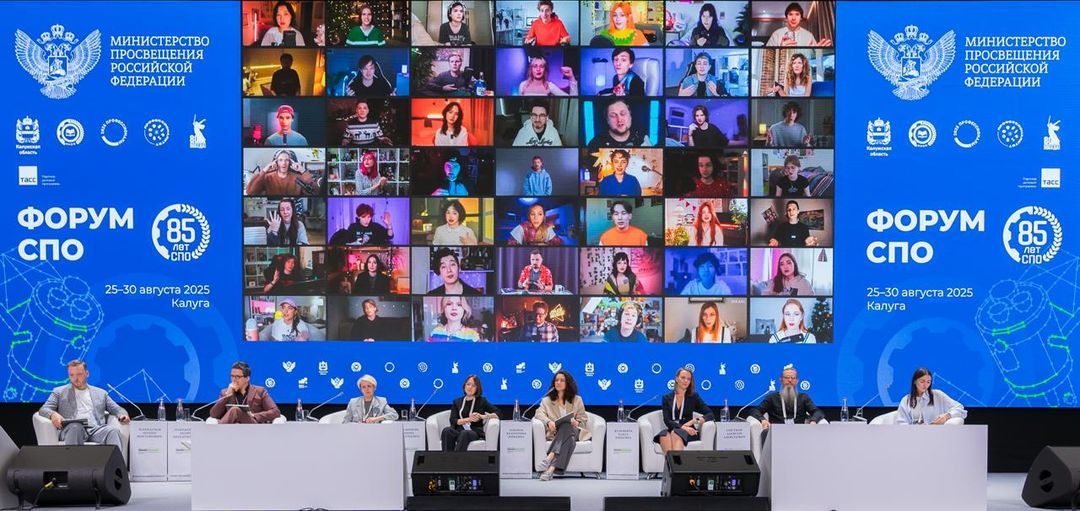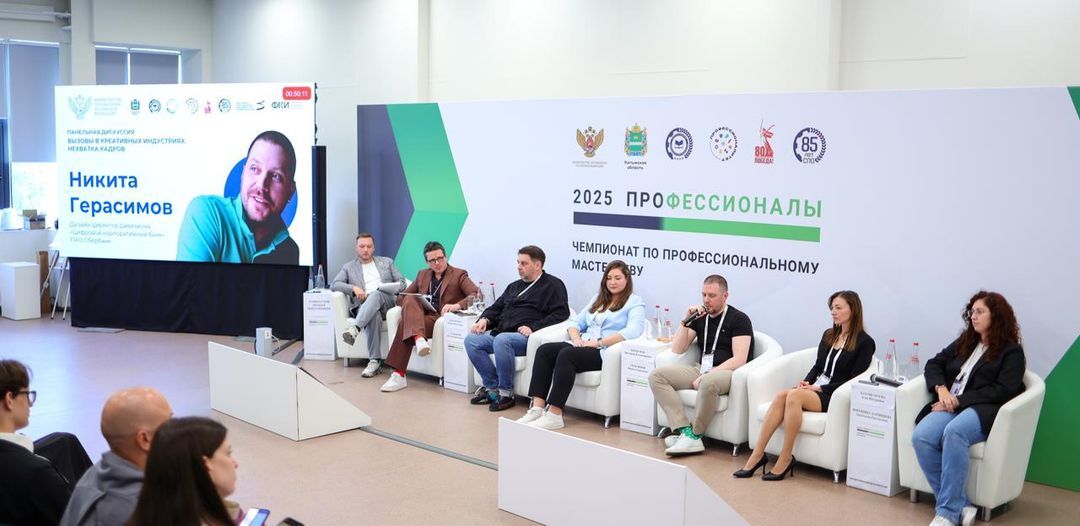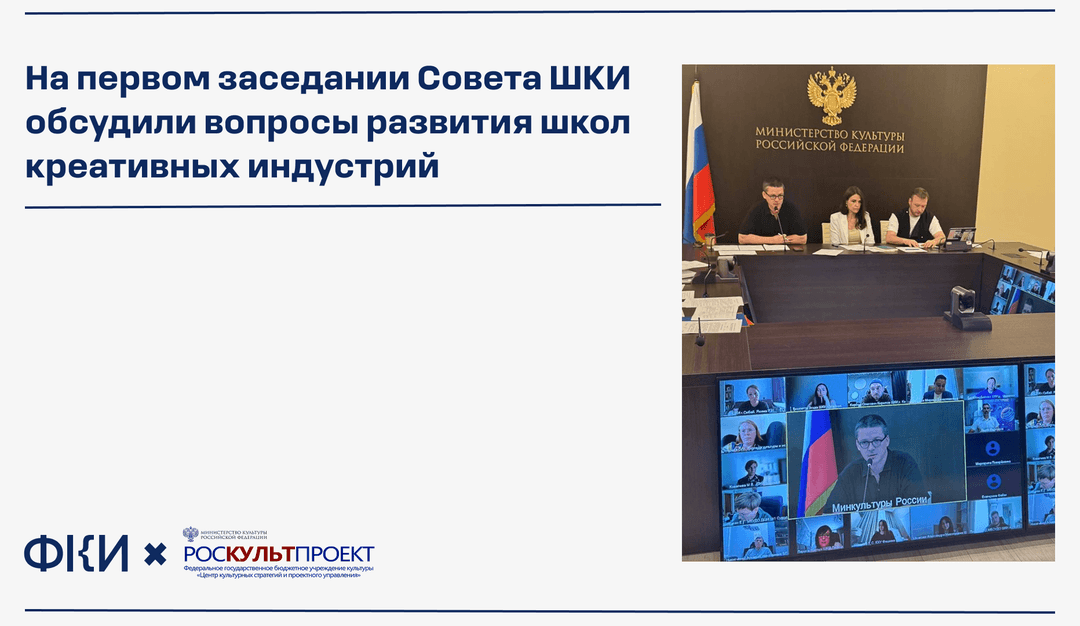

On the Forum Platform, CIF Discussed Aligning Vocational Education with the Needs of the Real Creative Sector

From August 25 to 29, the Federal Technopark for Vocational Education in Kaluga hosted the Forum on Secondary Vocational Education (SVE). The Creative Industries Federation (CIF), together with the Institute for the Development of Vocational Education (IDVE) under the Ministry of Education of the Russian Federation, held a plenary session titled «From Creative Colleges to Creative Industries in Colleges.» The session brought together leaders and experts from the creative sector and representatives of the vocational education infrastructure to discuss the modernization of educational approaches, strengthening links between colleges and potential employers, attracting grant funding, and protecting intellectual property rights.
Opening the session, IDVE Vice-Rector and project lead for the establishment of creative colleges, Ioann Klindukhov, shared current statistics:
«Today, 2,015 colleges across the country offer 62 professions and specialties related to the creative industries, with approximately 602,000 students enrolled. Our goal is to scale the model being piloted in 20 creative industry colleges to all regions. This model includes establishing project and production centers that bring industry professionals into teaching roles, enable them to earn within college environments, and foster student teams capable of developing creative products, participating in grant competitions, and fulfilling real industry orders.»
Valentina Ilyina, Head of Educational Programs at the Creative Industries Lab of the SKOLKOVO School of Management, presented findings from a joint study with the Roscongress Foundation’s Innosocium Initiative:
«Our research shows rising employment across all key areas of the creative industries. However, there is a marked shortage of technical and engineering talent in the sector, revealing a skewed balance between humanities and technical disciplines. On the bright side, employers are increasingly open to hiring young professionals, which calls for the development of mentoring systems and long-term motivation strategies.»
The importance of mentorship was echoed by Alexey Snetkov, Head of the Project and Production Center and Workshop Manager at the Krasnoyarsk College of Services and Entrepreneurship:
«We quickly realized that the key challenge lies in human resources. Involving industry practitioners in teaching was crucial. While academic instructors remain important, integration into the real economy requires collaboration with professionals currently active in the market. We now have such professionals — not many yet, but they play a critical role.»
Another crucial aspect is securing funding for creative projects. SVE programs must include modules on project packaging for grant competitions, such as those run by the Presidential Fund for Cultural Initiatives (PFCI).
Olga Kuzmina, Head of Training and Regional Development at PFCI, emphasized:
«Graduates should not only be capable of creating creative products but also of attracting resources for project implementation through participation in grant competitions. Additionally, they gain practical experience by joining creative teams already engaged in such competitions. This ensures their projects yield both socio-cultural and economic impact.»
Ekaterina Dubskaya, Head of a division at the Orenburg College of Economics and Informatics, explained how students gain real business experience:
«Last year, we partnered with 20 companies and completed around 50 projects in creative and IT development, involving over 1,000 students. We earned more than 100 million rubles — a significant figure for a college.»
Irina Yakovleva, Deputy Chair of the Russian Center for the Circulation of Rights to Creative Works, reminded attendees of the importance of intellectual property (IP) rights:
«While discussing colleges’ financial success, we must not overlook IP rights. From the first year, students should be trained in IP registration — this must become a mandatory part of the curriculum.»
What kind of graduates do leading companies in the creative sector expect? According to Inna Golysheva, Head of Grant Support at MTS Live:
«An ideal candidate in entertainment or media would have foundational knowledge in project development, financing, copyright, and IP law in the context of the creative industries. Practical experience and real-world cases are essential. Candidates should be capable of applying theory, solving complex problems, adapting quickly, and understanding the full content production cycle. Leadership, teamwork, communication, and stress resilience are key soft skills. Building competitive professionals in creative industries is complex but achievable with a comprehensive approach combining quality education, hands-on experience, and ongoing self-development.»
Continuing the discussion on collaboration between education and creative business, Andrey Tuboltsev, CEO and Co-Founder of Dreamlaser Studio, shared his company’s experience:
«We’ve been exploring various collaboration formats with educational institutions. Two years ago, we helped launch a school for creative industries in Nizhny Novgorod, where our team taught design and 3D modeling. We work closely with the technopark and are grateful to IDVE leadership for frequent interaction. One notable project involved the Hermitage Museum, where college students created an entire interactive space using motion graphics, AI, and digital art. We hope to scale this work further and take a more systematic approach.»
Summarizing the session, Igor M. Namakonov, CEO of the Creative Industries Federation, outlined the key principles for developing an industry-driven approach in vocational training:
· Creative industries are relevant not only to dedicated colleges but to all colleges developing adjacent competencies.
· A multidisciplinary perspective is crucial, regardless of specialization.
· Colleges must host employers not just for guest lectures but with permanent offices and real engagement.
· A successful college today is a training and production complex plus a project and production center.
· Grant writing and IP management should be introduced as early as possible.
· Creative industry colleges must not only be self-sustaining — some already are in various regions.
«Most importantly,» Namakonov concluded, «to make all this work, we need to gather regularly like this — to communicate, collaborate, and build a shared roadmap for future action.»
Event recording:
https://vkvideo.ru/video-218493153_456239858
Photo gallery:







